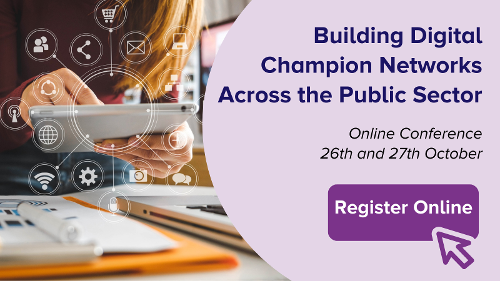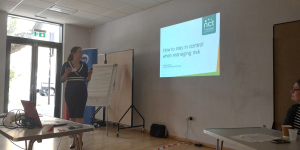Digital Champions: What are they and what do they do?
Whether you know them as Digital Buddies, Digital Eagles, Digital Wolves or Digital Champions, a multitude of volunteer-led initiatives have sprung up across the UK in recent years. Their mission: to tackle digital exclusion by enhancing the digital literacy and online confidence of people in the UK. With research from Ofcom showing that 11% of the UK population do not have access to internet in the home at all and the Lloyds Bank UK Consumer Digital Index 2021 finding 22% (c. 11.7m) lacked the ‘essential digital skills’ needed for day-to-day life, there is a wealth of evidence demonstrating the need for Digital Champions networks to help tackle the digital divide.
What is a ‘Digital Champion’?
A Digital Champion is generally, although not always, a volunteer who works with individuals or small groups to teach them digital skills. To be a Digital Champion you don't necessarily need to be an IT expert or have a degree in coding, all you need is patience, enthusiasm, and empathy. Most Digital Champions networks offer training and support for their Champions or mentors, to get them up to speed with what people want to learn. The Salford Foundation's volunteers were students who had missed their NCS experience, Carers Support Merton had ex-carers on board to support their service users, and many networks were bursting with retirees, furloughed staff, uni students and more who were all primed and ready to help build and improve the nation's digital skillset. To keep it simple, there's no one-size fits all for a Digital Champion network, nor is there only one type of person that makes a good volunteer.
Why do we need them?
According to research by the NHS to be digitally literate you must: possess enough digital skills to navigate the online world, have access to an internet connection or Wi-Fi, and lastly you must be able to access services. Without all three, it is highly likely that an individual is experiencing digital exclusion. For some, the restraints preventing them in getting online is something that they have no control over, either they cannot afford a device or connectivity, or perhaps they have additional accessibility needs that some websites do not cater for. For others, staying offline has been a choice resulting from lack of skills, confidence, motivations, or desire to use digital services. This is where Digital Champions come in: Digital Champions support the development of digital literacy and confidence online so that individuals are able to continue to access our ever-increasing digital world.
Whilst more people have recognised how important being online is in the last decade, the acceleration of digital transformation that resulted from the Covid-19 pandemic is unrivalled. As we all know, essential services moved online almost overnight, countries were placed into lockdown measures, and all non-essential retail was shut. For many digital natives this was an inconvenience but a manageable one, with food shops, doctors appointments and work meetings all now being conducted virtually. For those with basic digital skills the transition was not so smooth, and digital exclusion only further compacted feelings of social isolation for some of the most vulnerable members of our society.
What does a ‘Digital Champion’ do?
How Digital Champions work varies from initiative to initiative; however, the core premise remains the same: supporting people in getting online. Despite the misconceptions that digital exclusion is limited to older people who are unfamiliar with ‘new technology’, this is absolutely not the case. Digital exclusion is multi-faceted and can impact any person, of any age. There are however some key indicators that can contribute to whether someone is more or less likely to be digitally excluded. These are as follows: being unable to meet the economic demands of connectivity and device cost; geographic exclusion, poor network connectivity and broadband speed; and reduced digital literacy and knowledge of how to use technology. A study from King’s College London showed that out of the 8 million people that don’t use the internet, over 90% are economically and socially excluded, and more likely to be in the lowest income bracket, have a long-standing health condition, or have a disability. As such, it is clear that digital exclusion is merely a symptom of the broader issue of social exclusion.
Who can use ‘Digital Champions’ services?
Despite the perception that you are either digitally excluded, or you are not, digital exclusion is a spectrum with numerous factors contributing to where an individual would place. There is a huge misconception that young people, our 'digital natives', are innately digitally included. However, there are many children and young people that only have digital access in school, either lacking a device or connectivity at home. This has been evidenced throughout the pandemic, with the government providing over 1.3 million devices to schoolchildren so that they were able to access remote learning. So are those who, although they have access to the internet and a device, lack the skills to use this beyond the simplest ways. As such, the initiatives that have emerged out of the Covid-19 crisis are as varied and complex in their service delivery.
One example, Scottish charity Outside the Box, adopted a hyperlocal and community-centred approach to support excluded older residents in and around the geographically isolated towns and villages of the Scottish Borders. Using local volunteers, who knew the area and could offer shared experiences and common ground enabled Outside the Box to best support their service users. Other organisations, such as the large digital inclusion charity the Good Things Foundation were able to do this on a much larger scale, working with over 5,000 community organisations with over 15,000 Digital Champions to ensure that volunteers were strategically placed in community centres, local charities, and social housing providers reach those most in need. The Good Things Foundation also provided a free online learning platform Learn My Way to support users in gaining the digital skills that they wanted.
How can I get involved?
Hopefully, this blog has provided some useful information as to what a Digital Champion actually is, how they work, and why they are so important. If you or your organisation are keen to get involved there are a huge range of Digital Champions programmes across the UK, so get online and see what is happening around you. Additionally, here at Inside Government we are running our ‘Building Digital Champion Networks Across the Public Sector’ Conference on the 26th and 27th October this year. Delegates will hear updates from leading figures and organisations working with Digital Champions, as well as case studies of how Digital Champions have been used across the public sector so far and the impact that this has had.




